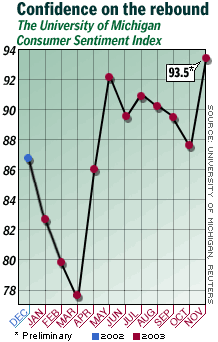NEW YORK (CNN/Money) -
A closely watched measure of consumer confidence in the United States rose in November, according to a published report Friday, exceeding Wall Street expectations.
The University of Michigan's consumer sentiment index rose to 93.5 in the preliminary reading for the month from 89.6 in October, according to market sources quoted by Reuters. Economists, on average, expected a reading of 91.3, according to Briefing.com.
The reading was the highest since 96.9 in May 2002.

"Despite the headwinds of reduced mortgage refinancings and the end of the $400 tax credits for children, consumers seem to be moving forward and embracing the overall improvement in the economic fundamentals," said Anthony Chan, chief economist at Banc One Investment Advisors.
The university's current conditions index, which measures the way consumers feel about the present state of the economy, rose to 102.8 from 99.9 in October.
It was the highest reading for the current conditions index since 103.4 in March 2001, the month the latest recession began.
The expectations index, measuring consumer's hopes for the near future, rose to 87.6, the highest level since 91.4 in May 2003, from 83 in October.
U.S. stock prices were mixed after the report, which came amid a flood of other economic data, including reports on October retail sales, producer prices, and industrial production. Treasury bond prices were mostly higher.
Wall Street pays close attention to consumers, whose spending makes up more than two-thirds of the total economy. After robust spending in the third quarter, driven by child tax credit checks and cash from mortgage refinancings, consumers were expected to pull back their spending in the fourth quarter.
Friday's report somewhat contradicts a warning on Thursday from the CEO of Wal-Mart (WMT: Research, Estimates), the world's biggest retailer, that consumers still were cautious.
Wal-Mart's warning raised concerns that the critical holiday shopping season might not be as robust as many on Wall Street expect. Friday's report of a gain in the Michigan sentiment index -- which has not yet been confirmed by concurrent gains in the ABC/Money weekly consumer confidence survey or the broader Conference Board monthly survey -- suggests consumers might be willing to spend, after all.
The Michigan sentiment index is based on a survey of about 500 households, while the Conference Board survey is based on a survey of about 5,000 households. The ABC/Money poll is based on a survey of about 250 people.

|

